Tribute to
Jean Ristil Jean Baptiste
March 1, 2012by Ezili Dantò
The wonderful Jean Ristil surrounded by children at his May-June 2009 Fondasyon Kolézépol Photography Workshops – Photo: ©Jennifer Pantaléon
 On Feb. 25, 2012, the sun set on the life of Jean Ristil Jean-Baptiste. We lost a great warrior, courageous and committed. Jean Ristil suffered from chronic ill health, anxieties and stress, but for him, saying he was feeling fine was an automatic reflex, almost to the very end, even when it wasn’t true.
On Feb. 25, 2012, the sun set on the life of Jean Ristil Jean-Baptiste. We lost a great warrior, courageous and committed. Jean Ristil suffered from chronic ill health, anxieties and stress, but for him, saying he was feeling fine was an automatic reflex, almost to the very end, even when it wasn’t true.He wanted to live. He was only 31 years old. He spent months before his death in hiding because of the constant threats to his life from the Duvalierist retaking of Haiti behind U.S.-U.N. firepower and false NGO charity.
Jean Ristil gave his life, all his love, even his health for Haiti. His blood flowed for Haiti. He was a brave and consequential man. He was our true brother – Dessalines’ descendant. He never sold Haiti out to the foreigners. He knew it was the blood of the Ancestors which gave us our freedom. It was not a gift the whites made us.
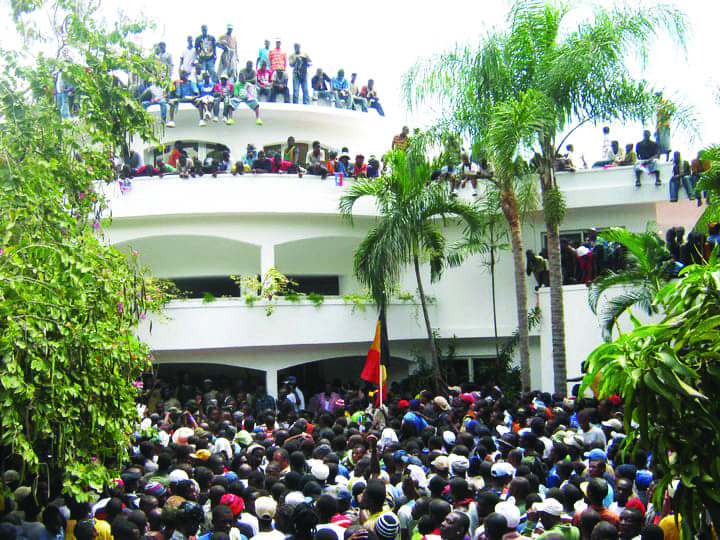 Jean Ristil’s photographs are etched into our hearts. Here are some of our favorites that the Bay View has run over the years. This is his classic photo of the outpouring of love shown to former President Aristide and his family on March 18, 2011, the day they returned to Haiti for the first time since the Feb. 29, 2004, coup. They poured into the yard of his home, even onto the roof, to welcome him home at last. – Photo: Jean Ristil Jean BaptisteJean Ristil was born in Site Solèy (often spelled in French as Cité Soleil), Haiti, on Dec. 12, 1981. Jean lived his entire life in the city. Through good times and bad times, he was always there for the people of Haiti. He was thrown in jail under the Gerard Latortue regime. He was persecuted. They beat him many times for his work as a journalist and photojournalist. He fought hard to give voice to the voiceless.
Jean Ristil’s photographs are etched into our hearts. Here are some of our favorites that the Bay View has run over the years. This is his classic photo of the outpouring of love shown to former President Aristide and his family on March 18, 2011, the day they returned to Haiti for the first time since the Feb. 29, 2004, coup. They poured into the yard of his home, even onto the roof, to welcome him home at last. – Photo: Jean Ristil Jean BaptisteJean Ristil was born in Site Solèy (often spelled in French as Cité Soleil), Haiti, on Dec. 12, 1981. Jean lived his entire life in the city. Through good times and bad times, he was always there for the people of Haiti. He was thrown in jail under the Gerard Latortue regime. He was persecuted. They beat him many times for his work as a journalist and photojournalist. He fought hard to give voice to the voiceless.Jean Ristil fearlessly, even recklessly faced the complexities and harsh realities of living in Site Solèy – the poorest, most destitute community in the Western Hemisphere. He was a living library of information which he extended to the world as a Haiti journalist, photographer, community leader, founder of Fondasyon Kole Zepòl Pou Sove Timoun Site Solèy and longtime member of the HLLN (Haitian Lawyers Leadership Network)-Ezili Dantò Witness Project.
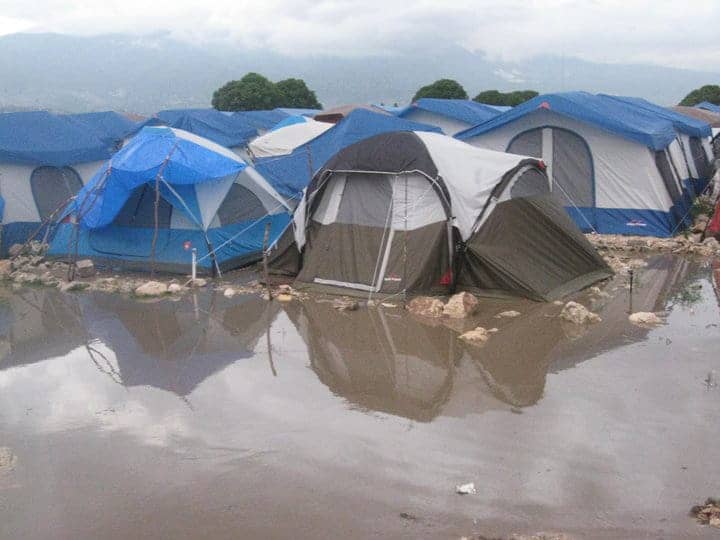 When the rains came in June 2010, five months after the earthquake, these meager tents housing suvivors in Cite Soleil were surrounded by a lake. The tents, then new, are now tattered and torn but still home. – Photo: Jean Ristil Jean BaptisteJean Ristil was an information source for us at Ezili Dantò’s HLLN from 2004 to the present on what was going on in the populous neighborhoods under attack by the U.S.-U.N. occupation forces. A loyal friend, a soldier for justice, a respected leader in Site Solèy, an indomitable spirit.
When the rains came in June 2010, five months after the earthquake, these meager tents housing suvivors in Cite Soleil were surrounded by a lake. The tents, then new, are now tattered and torn but still home. – Photo: Jean Ristil Jean BaptisteJean Ristil was an information source for us at Ezili Dantò’s HLLN from 2004 to the present on what was going on in the populous neighborhoods under attack by the U.S.-U.N. occupation forces. A loyal friend, a soldier for justice, a respected leader in Site Solèy, an indomitable spirit.Jean led with a quiet energy. You reached out, he was there, watching, already in the mix, listening intensely, ready to be of service, to share. He had stubborn determination. He hustled, he had game, he refused to be defeated. No matter the difficulty, he expected to come through it safely.
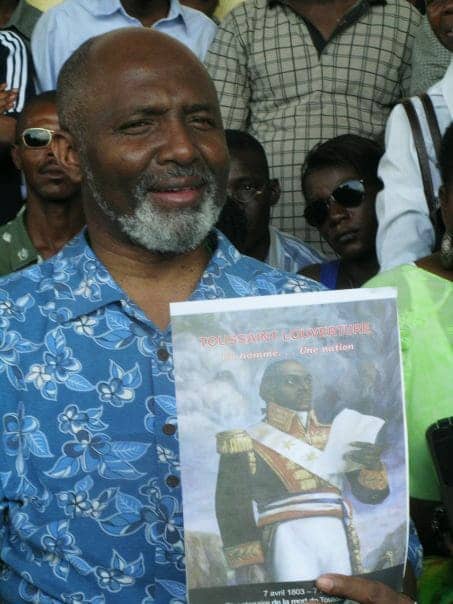 Jean Ristil worked closely with the beloved Father Gerard Jean-Juste. – Photo: Jean Ristil Jean BaptisteHe would take on a task, even when he had no idea how to get it done, but then he’d make a way. Jean frustrated you sometimes but you forgave him. What are you going to do? It wasn’t Jean Ristil’s fault that he scared you to death always facing danger so directly – going where angels fear to tread. Not his fault he had to feed and provide for so many who would otherwise go hungry in NGO-occupied Haiti.
Jean Ristil worked closely with the beloved Father Gerard Jean-Juste. – Photo: Jean Ristil Jean BaptisteHe would take on a task, even when he had no idea how to get it done, but then he’d make a way. Jean frustrated you sometimes but you forgave him. What are you going to do? It wasn’t Jean Ristil’s fault that he scared you to death always facing danger so directly – going where angels fear to tread. Not his fault he had to feed and provide for so many who would otherwise go hungry in NGO-occupied Haiti.It wasn’t Jean Ristil’s fault that he scared you to death always facing danger so directly – going where angels fear to tread. Not his fault he had to feed and provide for so many who would otherwise go hungry in NGO-occupied Haiti.
Jean Ristil was the real thing. He could not look away or betray his community – as the most educated, privileged and powerful in Haiti, in the world, at the U.N. Security Council do. Jean didn’t live to make a profit over people but to be of service.
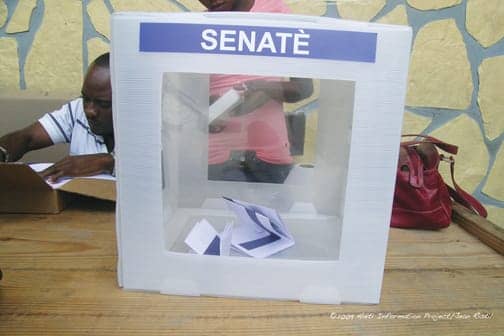 When former President Aristide’s party, Lavalas, was banned from the April 19, 2009, ballot, Haitians boycotted the election. This photo of the nearly empty ballot box dramatically illustrates the success of the boycott. – Photo: Jean Ristil Jean BaptisteWe’ll miss Jean Ristil. So much. His work and courage remain to inspire us, to keep us going forward.
When former President Aristide’s party, Lavalas, was banned from the April 19, 2009, ballot, Haitians boycotted the election. This photo of the nearly empty ballot box dramatically illustrates the success of the boycott. – Photo: Jean Ristil Jean BaptisteWe’ll miss Jean Ristil. So much. His work and courage remain to inspire us, to keep us going forward.He spent all his time helping the children in Site Solèy – especially those without fathers, those without mothers. Everyone of consequence who knew him loved Jean Ristil, loved what this humble man did with his life.
He didn’t have much formal schooling, but he was a degreed professor in the university of life. He knew the real meaning of “honor and respect.” He educated us: His life showed us how a Haitian without material means fights on without rest for justice for the people. His life showed us the very meaning of being in the struggle for justice.
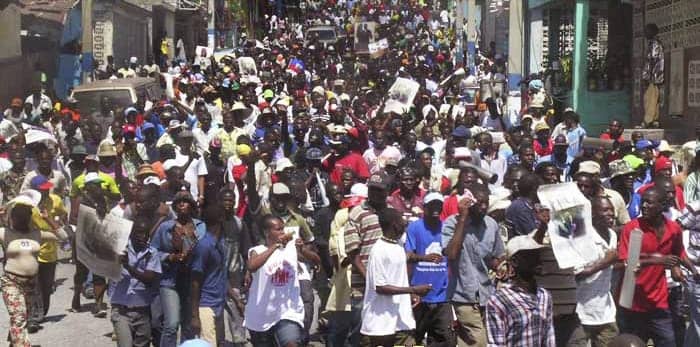 The coup that saw U.S. Marines pluck democratically elected President Aristide and his family out of Haiti and fly them to the Central African Republic occurred on leap year day, Feb. 29, 2004, perhaps, considering Haitians’ habit of marking anniversaries with huge marches, to foil commemorations. But they were held every year anyway, this one on the first leap year day following the coup, Feb. 29, 2008, in Port au Prince. – Photo: Jean Ristil Jean BaptisteHis life is testimony that a genuinely educated man is a man with empathy for those less privileged. Pale Fransé pa edikasyon (Speaking French doesn’t necessarily mean you’re educated.)
The coup that saw U.S. Marines pluck democratically elected President Aristide and his family out of Haiti and fly them to the Central African Republic occurred on leap year day, Feb. 29, 2004, perhaps, considering Haitians’ habit of marking anniversaries with huge marches, to foil commemorations. But they were held every year anyway, this one on the first leap year day following the coup, Feb. 29, 2008, in Port au Prince. – Photo: Jean Ristil Jean BaptisteHis life is testimony that a genuinely educated man is a man with empathy for those less privileged. Pale Fransé pa edikasyon (Speaking French doesn’t necessarily mean you’re educated.)A great warrior, great warrior. Jean Ristil Jean-Baptiste, we wanted to save you. An avan, an avan for Jean Ristil, his children, family and all in need in Site Soley. We mourn our loss but rejoice in the memory of his ceaseless struggle for justice and equality. Nou pap bay legen (We will not give up).
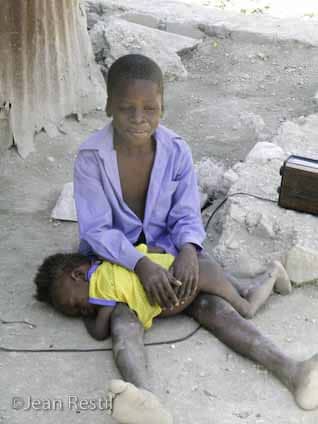 When starvation looms in Haiti, a special clay containing calcium and other nutrients from near the town of Hinche in the Central Plateau is combined with salt and vegetable shortening to make cookies that are dried in the sun and eaten. As these children’s lethargy testifies, the cookies help to sustain life – barely. – Photo: Jean Ristil Jean BaptisteHe worked for justice, to bring life and health to Haiti. He kept his honor. Ayibobo pou ou Jean Ristil (All hail Jean Ristil). He was our genuine brother and, as Jean once wrote, “God will never forget those he loves.” Haitians with loving hearts will never forget you.
When starvation looms in Haiti, a special clay containing calcium and other nutrients from near the town of Hinche in the Central Plateau is combined with salt and vegetable shortening to make cookies that are dried in the sun and eaten. As these children’s lethargy testifies, the cookies help to sustain life – barely. – Photo: Jean Ristil Jean BaptisteHe worked for justice, to bring life and health to Haiti. He kept his honor. Ayibobo pou ou Jean Ristil (All hail Jean Ristil). He was our genuine brother and, as Jean once wrote, “God will never forget those he loves.” Haitians with loving hearts will never forget you.We are tired of death. Tired that so many of our warriors are dying, brave men like Jean Ristil Jean-Baptiste who work for social justice in Haiti but never live to see justice done for themselves nor for their children. He leaves the rest to us.
For more information
To learn more about the life and legacy of Jean Ristil Jean Baptiste, read the HLLN Sept. 9, 2005, post “Free Kevin Pina and Jean Ristil,” photos of his 2009 Cité Soleil Photography Workshops taken by Jennifer Pantaléon and the photos Jean Ristil took recently for HLLN. Visit Kole Zepòl Pou Sove Timoun and Facebook pages Jean Ristil Jean Baptiste and Zanmi Lakay.
Ezili Danto, award winning playwright, performance poet, dancer, actor and activist attorney born in Port au Prince, Haiti, founded and chairs the Haitian Lawyers Leadership Network (HLLN), supporting and working cooperatively with Haitian freedom fighters and grassroots organizations promoting the civil, human and cultural rights of Haitians at home and abroad. Visit her at www.ezilidanto.com or www.open.salon.com/blog/ezili_danto. This story was translated by the Haitian blogger.
This is Jean Ristil’s footage of the U.N. December 2006 massacre in Site Soley, Haiti. The U.N. lied, said they only shot “gangsters” on Dec. 22, 2006. Jean Ristil interviews those “gangsters” – innocent, unarmed civilians in Site Soley – as they lay dying from U.N. bullets. @haitiinfoproj
Jean Ristil’s footage of the July 2005 massacre in Site Soley is at the end of “Haiti: We Must Kill the Bandits.” @haitiinfoproj
__________________________
FRIDAY, MARCH 2, 2012
Jean Ristil:
The People's Journalist of Haiti
by Kevin PinaI'm sure we all know someone that works tirelessly on behalf of their convictions never caring much about recognition as others around them receive the attention, credibility and accolades. Jean Ristil was exactly that kind of unique soul who cared less about his own recognition than what others were actually doing for his community and his people. Although Jean Ristil was no stranger to being marginalized by those who felt more entitled, it didn't matter to him because in the end talk was cheap and life was more precious. Growing up and living in Cite Soleil in Haiti, Jean knew never to judge anyone, Haitian or foreigner, by what they said or claimed but by what they actually did for others. Jean Ristil was a people's journalist, unafraid to take chances to show the world the truth about Haiti and Cite Soleil. During the dark days of repression and murder against Lavalas supporters between 2004-2006, we were part of a team that formed an underground network to collect and distribute information from the grassroots in Haiti to the rest of the world. Jean Ristil was one of the most courageous people I've ever known. When no one else would dare to report on police raids and indiscriminate killings in neighborhoods like Cite de Dieu, Cite Militaire and Bel Air, Jean Ristil would pack his camera and run, not walk, to get the photographic evidence. He knew that since the corporate media and human rights organizations had turned a blind eye to Haiti, in the end all the world would ever see was the photographic evidence we provided of the killings. Jean Ristil also watched my back on countless occasions while I was videotaping massive Lavalas protests during this period where the police would simply start shooting at people randomly to sow terror. When the US Marines or the UN troops moved against him I would intervene and when the Haitian police came against me he would come to my aid sometimes telling them I was a "stupid blan reporter who didn't know any better." I remember one time it was clear that one particular Haitian SWAT officer knew exactly who I was and what I was doing when Jean played the "stupid blan" card. The SWAT cop lifted his black ski mask to look closely at the press badges hanging from our necks then smiled and waved us on saying, "I know who you two are. Get out of here." To this day I like to think there was a begrudging tone of respect in that policeman's response for the loyalty Jean and I regularly showed each other in the field. Jean Ristil was an organic intellectual with nerves of steel. I remember a conversation Jean and I had in June 2005 one month before the UN massacre he documented in Cite Soleil. We were discussing what to do about the injured and dying shot by the UN and the Haitian police we were confronting on a daily basis. Was it better to help them if we could or to stay detached to document what was going on. It was a painful discussion with both of us changing sides and positions many times. In the end we decided that if we thought we could actually help save a life we would, but that if someone was clearly dying of their wounds we would be honoring them more if we documented their death. Our thinking was that no one would ever know these people in the poor neighborhoods of Haiti had ever lived save for our documenting their deaths for the world. A month later after the UN raid in his community of Cite Soleil on July 6, 2005, Jean would be put to the test. As Leonce Chery lay dying of a single shot to his jaw from a high-powered rifle, Jean stayed with him until the end. It took seven minutes for Leonce to bleed out and die and Jean captured every second of his excruciating death on camera. Yes, Jean Ristil was a courageous soul who didn't suffer from post traumatic stress syndrome but learned to live with acute traumatic stress in his everyday existence in Cite Soleil. His was a soul and personality of iron.
On September 9, 2005, Jean Ristil would once again jump into the breach. It was already a strange day when I received a frantic phone call from Jean saying that the police were searching Father Gerard Jean-Juste's residence at St. Claire's church in Ti Place Cazeau. Jean-Juste was being held in prison and Jean Ristil was convinced the police were going to try to plant guns in the church to justify his arrest. "Pina, you've got to come now!" he yelled over the telephone. Jean was waiting for me as I arrived and followed me as I jumped a fence and began filming the police searching Jean-Juste's bedroom. A judge accompanied by several large police wearing black ski masks grabbed my arm and tried to take my camera calling me a "White Lavalas Bandit!" I quickly spun to protect my camera yelling "I have the right to film!" as the judge's own momentum sent him flying to the floor in a heap. I told Jean to leave as the police rushed me. The judge, in a screaming and spitting fury, ordered me arrested on the spot. Jean Ristil was out in front of the church videotaping as they escorted me out in handcuffs. Suddenly the judge turns to one of the masked policemen and tells them, "Take this one too. He's with the blan" and now both of us are handcuffed and thrown into the back of a jeep. Jean Ristil spent two days in jail thinking they would keep him longer because he was Haitian and let me go because I had a US passport. When it turned out they let him go a day earlier and the judge ordered me to stay behind bars "until I decide your fate for disrespecting me," Jean Ristil said to me as he left the jail, "Don't worry. you're Haitian now, we'll make sure nothing happens to you."
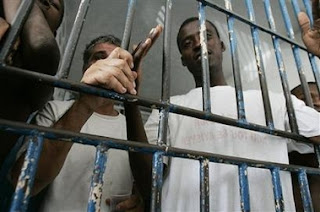 |
| Kevin Pina and Jean Ristil behind bars in Haiti on September 10, 2005. |
For all of his time spent documenting suffering and death, Jean Ristil refused to let it define him. Jean celebrated life in the present and had a clear vision of the life he wanted for the children of Cite Soleil in the future. I remember when Jean Ristil founded the organization Kole Zepòl Sove Ti Moun, Cite Soleil to help orphaned children in his community. Jean said he didn't want foreigners to come in and take the children out of their community to put them on display in their orphanage to raise money for their projects. Neither did he want them to end up as part of the scandalous system of adoption in Haiti that he saw as tantamount to human trafficking. No, Jean Ristil's idea was far simpler and direct. If you really wanted to support Haiti and Cite Soleil than support local families to adopt the orphans in the community. Support them to improve their lives even as they open their arms and hearts to children in their community left parent-less largely due to structural and state-sponsored violence. It was a unique and creative approach that is an example of the way Jean Ristil approached problems in Cite Soleil and in Haiti, with a clear sense of history. Jean Ristil was that rare person that serves as a bridge between grassroots activism and journalism in the world. Yes, he was truly the people's journalist of Haiti but what others said or didn't say about his work didn't seem to matter as much to Jean Ristil as it does to others. In the end, the only thing that seemed to really matter to Jean was what he was going to do next for his community and for Haiti.

